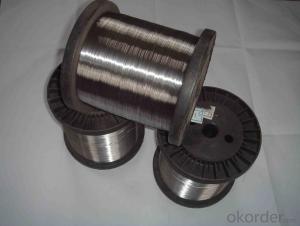Steel Spring Wire Hot Sale and High Quality
- Loading Port:
- Shanghai
- Payment Terms:
- TT OR LC
- Min Order Qty:
- 2000 kg
- Supply Capability:
- 10000 kg/month
OKorder Service Pledge
OKorder Financial Service
You Might Also Like
1.Packing And Delivery
Package: Seaworthy package
MOQ: 0.5 tons
Delivery: 15-20 days
Monthly Output: 100 tons
Payment : 30%T/T in advanced+70% balanced;irrevocable L/C at sight
Remarks: All-risk insurance and accept the third party test
Port : Shanghai
AISI 316 high tensile strength stainless steel spring wire
| Detail as follows: | |
| Standard | AISI,ASTM,GB,SUS etc |
| Grade | 201,202,204,301,303,304,304L,310,316,316L etc |
| Diameter | 0.7mm-14.0mm |
| Surface | Bright or matt |
| Condition | hard |
| Tolerance | +/-0.03mm |
| Length | According to customers’ requirement |
| Packing | Packed by weaved bag or according to customer's requirements |
| Technology | Cold drawn |
| Application | Spring |
| Productivity | 300 tons/month |
| MOQ | 100KG |
| Note | We can produce other standard as the customers' requirement |
1. Competitive price and quality from our own factory
2. Approved by ISO9001, CE, SGS every year
3. Best service with 24 hour`s reply
4. Flexible payment with T/T,L/C , paypal, kunlun bank, western union, etc.
5. Smooth production ability(50000tons/month)
6. Quick delivery and standard exporting package
7. OEM/ODM
- Q:How are steel pipes cleaned and flushed?
- Steel pipes are cleaned and flushed using a variety of methods. One common method is high-pressure water jetting, where water is forcefully sprayed through the pipes to remove debris and sediments. Chemical cleaning agents are also used to dissolve any stubborn deposits. Additionally, mechanical methods such as using wire brushes or pigs (devices inserted into the pipes to scrape the interior) can be employed to remove any remaining buildup. Regular maintenance and inspection are crucial to ensure the cleanliness and efficiency of steel pipes.
- Q:What is the purpose of steel pipes?
- The purpose of steel pipes is to provide a reliable and efficient means of transporting fluids and gases, such as water, oil, and natural gas, over long distances. They are also used in various industries for structural support, as well as in plumbing and construction projects.
- Q:How are steel pipes used in LNG terminals?
- Steel pipes are used in LNG terminals for the transportation of liquefied natural gas from storage tanks to various processing units within the terminal. These pipes are designed to withstand the extreme cold temperatures and high pressure of LNG, ensuring safe and efficient transfer of the gas. Additionally, steel pipes are also used for the distribution of LNG to various end-users, such as power plants or industrial facilities, providing a reliable and robust infrastructure for the delivery of this valuable energy source.
- Q:Are steel pipes suitable for high-pressure applications?
- Yes, steel pipes are suitable for high-pressure applications. Steel pipes are known for their strength and durability, making them ideal for handling high-pressure applications. They can withstand the internal pressure exerted by fluids or gases under high pressure without deforming or bursting. The high tensile strength of steel allows it to resist the forces that occur in high-pressure environments, ensuring the safety and reliability of the piping system. Additionally, steel pipes can be manufactured with thicker walls to further enhance their ability to withstand high pressures. Steel pipes are widely used in industries such as oil and gas, petrochemical, power generation, and water distribution, where high-pressure applications are common.
- Q:What is the creep resistance of steel pipes?
- The ability of steel pipes to withstand deformation or elongation over time when exposed to high temperatures and constant stress is referred to as their creep resistance. Steel pipes are highly regarded for their exceptional resistance to creep because of the inherent strength and stability of the material. The creep resistance of steel pipes can vary depending on factors like the composition of the alloy, heat treatment, and the conditions in which they are used. Creep is a phenomenon that occurs at elevated temperatures, causing materials to slowly deform under constant stress. In the case of steel pipes, this can be a concern in applications where they are subjected to high temperatures for extended periods, such as in power plants, industrial furnaces, or steam pipelines. The ability to resist creep deformation is crucial to maintain the structural integrity and longevity of the pipes. Steel pipes are often designed and manufactured using alloys with high creep resistance properties, such as chromium-molybdenum (Cr-Mo) steels or nickel-based alloys. These alloys possess excellent mechanical strength, thermal stability, and resistance to oxidation and corrosion, all of which contribute to their superior creep resistance. Moreover, heat treatment processes like quenching and tempering can significantly enhance the creep resistance of steel pipes. These treatments involve controlled heating and cooling cycles to optimize the microstructure of the steel, thereby increasing its resistance to deformation and improving its overall performance at high temperatures. It is important to note that the creep resistance of steel pipes is typically specified by industry standards and codes, such as the American Society of Mechanical Engineers (ASME) Boiler and Pressure Vessel Code. These standards define the allowable stress levels and design criteria for different steel pipe applications, ensuring that they meet the necessary safety and performance standards. In summary, steel pipes are renowned for their excellent creep resistance due to their inherent strength, stability, and ability to withstand high temperatures. The specific creep resistance of steel pipes may vary depending on factors such as alloy composition, heat treatment, and operating conditions. Proper design and adherence to industry standards are essential to ensure the desired creep resistance and overall performance of steel pipes in various applications.
- Q:Can steel pipes be used for brewery installations?
- Yes, steel pipes can be used for brewery installations. Steel pipes are commonly used in breweries for various applications such as transferring liquids, connecting equipment, and supporting structures. They are durable, resistant to corrosion, and can withstand high temperatures and pressures, making them suitable for brewery installations.
- Q:Can steel pipes be used for underground sprinkler systems?
- Indeed, underground sprinkler systems can utilize steel pipes. Renowned for their durability and strength, steel pipes prove to be a fitting choice for underground applications. Their resistance to corrosion and ability to withstand high pressure and temperature render them suitable for conveying water to sprinkler heads. Nonetheless, it is crucial to acknowledge that steel pipes may necessitate supplementary coatings or protective measures to prevent rusting and corrosion in the long run. Moreover, the cost factor should be taken into account as steel pipes may be pricier compared to alternative materials like PVC or polyethylene. All in all, steel pipes can serve as a feasible option for underground sprinkler systems, particularly in regions with more severe environmental conditions.
- Q:Are steel pipes suitable for offshore drilling platforms?
- Yes, steel pipes are suitable for offshore drilling platforms. Steel pipes have been used extensively in the offshore drilling industry due to their strength, durability, and corrosion resistance. Offshore drilling platforms operate in harsh marine environments where they are exposed to saltwater, extreme pressure, and temperature variations. Steel pipes are able to withstand these conditions and provide a reliable and long-lasting solution for transporting fluids such as oil and gas from the seabed to the surface. Additionally, steel pipes can be welded together, allowing for easy installation and maintenance on offshore drilling platforms. Overall, steel pipes have proven to be a suitable choice for offshore drilling platforms due to their robustness and ability to withstand the challenging conditions of the marine environment.
- Q:What are the common welding techniques used for steel pipes?
- The common welding techniques used for steel pipes include Shielded Metal Arc Welding (SMAW or stick welding), Gas Metal Arc Welding (GMAW or MIG welding), Flux-Cored Arc Welding (FCAW), and Gas Tungsten Arc Welding (GTAW or TIG welding).
- Q:What is the lifespan of galvanized steel pipes?
- The lifespan of galvanized steel pipes can vary depending on various factors such as the quality of the galvanization, the environment in which they are installed, and the maintenance they receive. However, on average, galvanized steel pipes can last between 40 to 70 years.
1. Manufacturer Overview |
|
|---|---|
| Location | |
| Year Established | |
| Annual Output Value | |
| Main Markets | |
| Company Certifications | |
2. Manufacturer Certificates |
|
|---|---|
| a) Certification Name | |
| Range | |
| Reference | |
| Validity Period | |
3. Manufacturer Capability |
|
|---|---|
| a)Trade Capacity | |
| Nearest Port | |
| Export Percentage | |
| No.of Employees in Trade Department | |
| Language Spoken: | |
| b)Factory Information | |
| Factory Size: | |
| No. of Production Lines | |
| Contract Manufacturing | |
| Product Price Range | |
Send your message to us
Steel Spring Wire Hot Sale and High Quality
- Loading Port:
- Shanghai
- Payment Terms:
- TT OR LC
- Min Order Qty:
- 2000 kg
- Supply Capability:
- 10000 kg/month
OKorder Service Pledge
OKorder Financial Service
Similar products
New products
Hot products
Related keywords





























